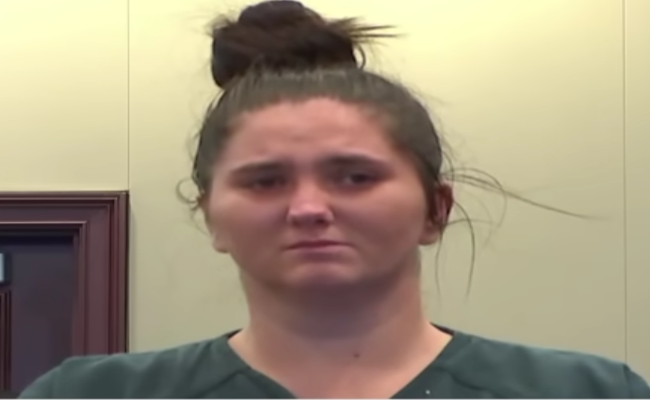Hannah Payne: The Tragic Story Behind a Life-Altering Decision
The Unfolding of a Controversial Case that Shook the Nation

Hannah Payne’s name has become synonymous with a complex and tragic incident that continues to capture public attention. The 21-year-old from Georgia found herself at the center of a national controversy when a single decision led to devastating consequences. This article delves into the harrowing story of Hannah Payne, exploring what led to her actions, the legal outcomes, and the broader implications of her case.
Introduction
The story of Hannah Payne is one that has left many in shock, sorrow, and deep contemplation. In May 2019, a seemingly ordinary day turned into a life-changing event for Payne, leading her from being a regular citizen to the accused in a high-profile murder case. This article explores the events that transpired, the legal proceedings, and the societal implications of her actions.
The Background: Who is Hannah Payne?
Hannah Payne was a young woman from Georgia, living what many would consider a typical life. At 21 years old, she was a college student, working hard to build a future for herself. Payne, who had a clean record and was known for her responsible nature, never seemed like someone who would find herself in the midst of a legal storm. However, a single decision on a fateful day would change her life forever.
The Incident: What Did Hannah Payne Do?
On May 7, 2019, Hannah Payne was driving in Clayton County, Georgia, when she witnessed a hit-and-run incident involving an elderly man, Kenneth Herring, who was 62 years old at the time. Acting on instinct, Payne decided to follow Herring’s vehicle, determined to stop him and ensure that justice was served. Payne, however, did not just follow the vehicle; she took matters into her own hands.
The situation escalated quickly. Payne allegedly blocked Herring’s car with her vehicle, confronted him, and in the ensuing confrontation, she shot and killed him. Payne claimed that the shooting was an act of self-defense, stating that Herring had reached for something in his vehicle, making her fear for her life. However, the evidence and testimonies presented during the trial painted a different picture, leading to a highly controversial and publicized legal battle.
The Legal Battle: Hannah Payne’s Verdict
Hannah Payne was charged with multiple felonies, including felony murder, aggravated assault, and false imprisonment. The case sparked significant public debate, with many questioning the motives behind Payne’s actions and whether her response was proportionate to the threat she claimed to have perceived.
Throughout the trial, Payne’s defense argued that she had acted in self-defense, driven by fear for her safety. However, the prosecution contended that Payne’s actions were reckless and unnecessary, pointing out that Herring was unarmed and that Payne had no legal authority to pursue or confront him.
In 2023, after a lengthy and emotionally charged trial, Hannah Payne was found guilty of felony murder and was sentenced to life in prison with the possibility of parole. The verdict sent shockwaves through the community, with some viewing it as a necessary consequence of her actions, while others argued that the punishment was too harsh for a young woman who made a terrible mistake in a moment of panic.
The Aftermath: Hannah Payne – What Happened Next?
The aftermath of the trial left many questions unanswered. Payne’s conviction has led to widespread discussions about the responsibilities and limits of civilian intervention in crimes, particularly in the age of increasing public vigilance. The case also highlighted the complex nature of self-defense claims and the legal ramifications of taking the law into one’s hands.
Hannah Payne’s story is a tragic reminder of how quickly a life can be altered by a single decision. While she may have believed she was doing the right thing by attempting to stop a crime, the outcome was far from what anyone could have anticipated. Now, Payne faces the consequences of that decision, with her future forever changed by the events of that day.
Analysis: Lessons Learned from Hannah Payne’s Case
The case of Hannah Payne raises critical questions about the limits of civilian action in law enforcement. While the instinct to intervene in a crime is understandable, this case demonstrates the potential dangers of taking matters into one’s own hands. It also underscores the importance of understanding legal boundaries and the risks associated with such actions.
This case has also prompted discussions about the justice system’s treatment of individuals who act out of a perceived sense of duty but ultimately cause harm. Was Payne a concerned citizen who made a grave mistake, or was she reckless in her pursuit of justice? The court’s decision reflects the complexity of these questions and the fine line between self-defense and unlawful aggression.
The Broader Implications: Society and Vigilantism
Hannah Payne’s actions and the subsequent legal proceedings have brought the issue of vigilantism to the forefront. In a society where crime rates and the perceived need for self-defense are rising, the line between citizen involvement and vigilantism can become blurred. This case serves as a cautionary tale for those who might feel compelled to take action outside the boundaries of the law.
It also raises important questions about the role of the justice system in addressing such cases. Should there be more education and public awareness about the legal limits of self-defense and citizen arrests? How can society balance the desire for public safety with the need to prevent unnecessary violence?
Conclusion: The Legacy of Hannah Payne’s Story
Hannah Payne’s story is one that will be remembered for its tragic outcome and the important legal and ethical questions it raised. Her case is a powerful example of how quickly a situation can escalate and how a single decision can have life-altering consequences.
As society continues to grapple with issues of crime, self-defense, and the role of civilians in law enforcement, the case of Hannah Payne will undoubtedly remain a key point of reference. Her story serves as a reminder of the importance of understanding the legal implications of our actions and the profound impact that a momentary decision can have on one’s life.
Reflecting on the Future: What Can We Learn?
The case of Hannah Payne is a sobering reminder of the potential consequences of taking the law into one’s own hands. It highlights the need for clear guidelines and education on the limits of civilian intervention in criminal situations. Moving forward, society must consider how to prevent similar tragedies while ensuring that justice is served in a fair and balanced manner.
As Hannah Payne serves her sentence, her story continues to resonate with those who follow her case. It serves as a warning and a lesson, not just about the legal system, but about the complexities of human decision-making and the often-unpredictable outcomes of our actions.



